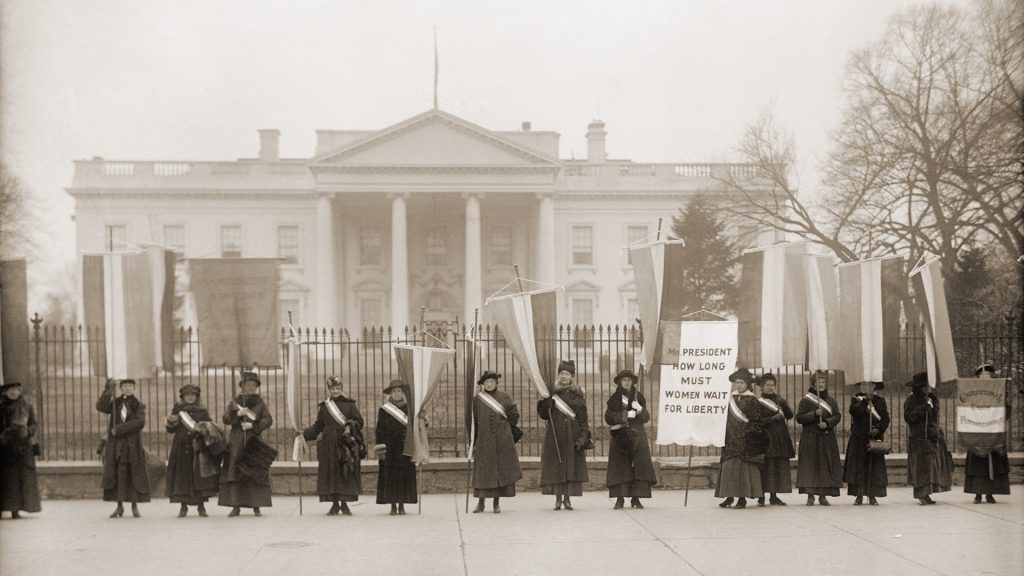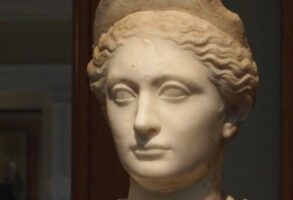
Published August 26, 2020
On this day, designated Equality Day in 1971, our nation officially celebrates a century of women’s suffrage. The suffragists worked for seventy years to convince both males and other females that women ought to share in the political responsibilities of republican government. The arguments that won the day one hundred years ago should help us think correctly about rights today.
We usually remember Susan B. Anthony, Elizabeth Cady Stanton, and Alice Paul for this feat. And well we should. Anthony’s tactical intelligence, gift for strategy, influential newspaper, and indomitable spirit forged with Stanton a successful campaign—one that Paul would bring to completion. Yet too often we assume that it was only their particular arguments that brought about the state-by-state support that federal ratification required. This is too simplistic a view.
At Anthony’s trial for illegally voting in a presidential election—a crime for which she has now been symbolically pardoned—Anthony famously appealed to the natural rights philosophy of the Declaration of Independence: “My natural rights, my civil rights, my political rights, my judicial rights are all alike ignored. . . . Your denial of my citizen’s right to vote is the denial of my right of consent as one of the governed.” Stanton had also argued this a quarter-century earlier at the Seneca Falls Convention in 1848. There, she and Lucretia Mott had employed the framework of the Declaration, comparing America’s unjust treatment of women to King George’s treatment of the colonies.
But appeals to natural rights alone did not move the hearts and minds of ordinary men or women. As Frances Willard, president of the Woman’s Christian Temperance Union (WCTU), argued, the franchise was a necessary “weapon in women’s hands. . . against the rum power, in defense of Home.” Moral suasion, the first bulwark against the vices that increasingly accompanied industrialization, had proved inadequate. Willard would end up persuading hundreds of thousands of her devotees in the WCTU’s local chapters to support women’s suffrage.
Willard’s moral appeal for the vote was successful because it refuted the most prevalent argument against the franchise: Women’s interests as citizens were properly represented by their husbands in a kind of vicarious—family—representation. Indeed, vicarious representation accorded well with Alexis de Tocqueville’s observations about the early republic. The public obligations male citizens undertook on behalf of their families were made possible by the private obligations women took on behalf of the same. Justice Joseph Bradley put it succinctly in an 1873 case denying Myra Bradwell’s right to practice law: “The paramount destiny and mission of woman are to fulfill the noble and benign offices of wife and mother.” This anti-suffrage argument is still made today.
In the wake of the Reconstruction amendments, Bradwell and other litigators had argued, with Anthony, that in addition to women’s hallowed roles in the family, they, like men, were both “persons” and “citizens” with “privileges and immunities” and were also due “equal protection of the laws.” Stanton went further still, famously declaring that since “we do not decide [a man’s] rights as an individual, as a citizen, as a man by his duties as a father, a husband, a brother, or a son,” a woman’s “incidental” roles in the family ought not keep her from being the sovereign “arbiter of her own destiny” too.
But Willard and her allies approached the issue from a different angle. Far better, they thought, to recognize that men actually were first and foremost members of families—fathers, husbands, brothers, and sons—who too often abdicated their familial duties, and so were not representing women very well. This moral failure on the part of men had become especially acute due to industrialization. Once an integral part of the cooperative and productive agrarian home, men increasingly worked for wages in urban settings where bars and brothels were more accessible.
Willard’s response to these moral failings was not simply to assert women’s rights as individuals, though she did that too. Rather, she persuaded scores of women to follow her lead by explaining that political and civil rights were the necessary means to fulfill their duties to their families, communities, and nation. “Not rights, but duties; not her need alone, but that of her children and her country,” Willard wrote. “[N]ot the ‘woman,’ but the ‘human’ question is stirring women’s hearts and breaking down their prejudice today. . . . For they begin to perceive. . . that the Ten Commandments and the Sermon on the Mount are voted up or voted down upon election day.”
Willard did not expect women alone to shore up the moral responsibilities owed to children and other vulnerable populations, as though men were incapable of leading moral lives. Rather, she believed that devoted fatherhood, like devoted motherhood, had the potential to transform men into people with the strong moral character the country needed. Men too ought to understand that rights, properly understood, presupposed such duties. Prioritizing what Willard called “the creed and cult of the cradle”—or the shared life of the home—could lead both men and women to work not for their own self-interest but for the common good of their families and the nation as a whole.
An understanding of the shared responsibilities underlying their common rights would also make men and women collaborative companions “in literature and science, in business and professional life, in church and state.” As Willard wrote, “When these two, with their individual outlook upon destiny, shall together set their heads to any problem, or their hands to any task, they shall unite in that endeavor the full sum of power that this world holds.”
When rights are regarded by both friend and foe alike as but grabs for power in a dog-eat-dog world, they lose the capacity to protect the weak and vulnerable. But when rights are seen for what they are—a civil and political apparatus born of the natural duties we owe to one another—they can make more visible our personal responsibilities and make more viable our common life together.
Erika Bachiochi is a fellow at the Ethics and Public Policy Center whose forthcoming book, The Rights of Women: Reclaiming a Lost Vision, will be published by Notre Dame University Press in 2021.




